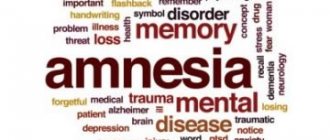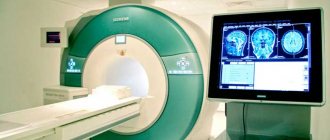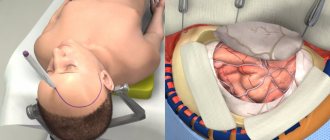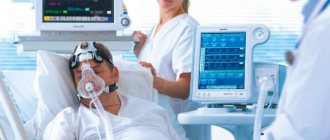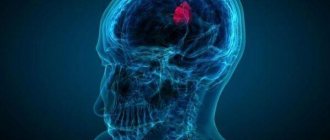Some diseases of the nervous system are accompanied by partial or complete loss of memory - amnesia. In this condition, a person loses the ability to reproduce information about himself and the events of his life.
Signs of amnesia manifest themselves in different ways and at any age, so it is advisable to have an idea of what types of amnesia exist, what are the reasons for the development of this condition, and also which specialists treat this ailment.
Kinds
Experts distinguish the following types of amnesia:
- Childhood - characterized by a person’s lack of memories of infancy. This condition is typical for almost every person.
- Anterograde - a person is unable to remember new events that have happened in his life.
- Retrograde - memories that occurred before its loss disappear from memory.
- Dissociative fugue - a temporary loss of identity occurs when a person mistakes himself for another, and then there is a sharp return of memory.
- Dissociative - specific facts or events from life are forgotten, but the person continues to retain universal knowledge.
- Transient epileptic – temporary memory lapses when the patient continues to behave adequately.
- Cryptomnesia – the source of the information received is forgotten, and the person passes it off as his own.
Complete and partial memory loss
A number of structures in the body are responsible for memory.
They are regulated by smell, instincts, emotions. When a part of the brain, the hippocampus, is damaged, a person loses memory. The most dangerous condition is when memory loss is caused by psychogenic escape. It is a dissociative disorder in which all memories of the past are erased. The person does not remember anything: who he is, what he did, who his relatives and friends are. This loss of self is called complete loss of memory. Recovery takes a long time; in some cases, memory may not return at all.
Most often, short-term memory is impaired as a result of depression. Partial amnesia is caused by the fact that the growth of brain cells is disrupted under the influence of stressors. The severity of the damage depends on the duration of the depressive state.
It happens that memories related to one event or period are lost. This is partial or episodic memory loss. With procedural memory loss, a person loses the ability to perform usual actions.
Based on their prevalence, there are two types of memory loss. With a complete loss, the individual loses all memories, and with a partial loss, individual fragments are missing. The duration of the violation can be anything from several days to decades.
Causes
Experts say one of the reasons for the occurrence of amnesia is the presence of mental and neurological diseases. It is these patients who often have memory problems. Pathologies that can trigger amnesia include epilepsy, dissociative disorder or multiple personality disorder, hysteria, schizophrenia and Alzheimer's disease.
Other provoking factors may be blunt or penetrating head injuries, infectious lesions of the brain or nervous system, including AIDS, hepatitis, and poisoning with toxic substances. In addition, it can be caused by: vitamin B1 deficiency in the body, hypoxia, impaired blood circulation in the brain tissue, the appearance of tumors, as well as surgical interventions.
How to intentionally lose your memory
In young people, memory loss can be triggered by certain psychological disorders. Amnesia can also be caused by the damaging effects of various factors on brain tissue.
Amnesia, which is observed in psychological disorders, is called psychogenic. It becomes the result of the action of the protective mechanisms of the central nervous system on psychological influence from the outside. An important characteristic of psychogenic amnesia in young people is the absence of any organic substrate.
Possible causes of psychogenic amnesia in young people include:
- mental illness;
- severe depression;
- chronic insomnia;
- extreme stress;
- hypnosis.
Severe psychological trauma causes various types of memory loss in patients, especially if it happened at a young age. When faced with an event that seems too scary and threatening to a person, the brain triggers defensive thought processes. This manifests itself in denial and repression. The victim completely denies the veracity of what happened and displaces everything connected with it from his memory.
The most common psychological traumas that cause memory loss in young people are:
- death of a parent, child or very close person;
- physical violence from another person (rape, beating, abuse of the person himself or his loved ones);
- natural disaster (fire, flood, earthquake, hurricane);
- wars;
- terrorist attacks;
- accidents;
- kidnapping.
In these cases, amnesia appears in young people if there is a certain “benefit” from the resulting memory loss. The main benefit is that by erasing all memories of an event, a person avoids difficult, painful experiences.
Amnesia in mental illness It is very common for young people with various mental illnesses to experience episodes of memory loss.
The main mental illnesses that are accompanied by episodes of amnesia in young people include:
- dissociative disorder;
- dissociative fugue;
- hysteria;
In epilepsy, episodes of amnesia occur during epileptic seizures.
With dissociative disorder, the patient develops a split personality - as if two or more people live in it at the same time. Memory loss occurs when switching from one role to another. The person who gains control of the body does not remember what happened during the entire period while she was “asleep.”
Dissociative fugue is a reaction of flight against the background of severe mental trauma. The patient suddenly leaves home, forgetting all information about his biography and the people who surrounded him. Memory loss does not apply to mastered skills - professional skills, the ability to play a musical instrument, the ability to draw.
A person creates a new personality for himself. But after some time the memory is restored. The flood of memories triggers a new episode of amnesia. The patient forgets the “fugue” personality, returning to his previous life. In most cases of psychogenic amnesia, memory is completely restored on its own or as a result of psychotherapy and hypnosis.
Pathogenic factors that cause organic amnesia in young people include:
- head injuries;
- infections of the nervous system involving brain structures;
- intoxication with various substances;
- eating disorders;
- severe hypoxia (lack of oxygen) of the brain;
- brain tumors;
One of the main pathogenic factors that causes amnesia in young people is head trauma. Open and closed craniocerebral injuries are almost always accompanied by damage to brain tissue. With severe concussions and contusions, a person loses from memory information about the incident and circumstances before and after the injury. The victim's memory may be erased from the hours, days, and even weeks leading up to the moment of injury.
Infections of the nervous system involving brain structures are accompanied by inflammation and damage to brain tissue. This often leads to amnesia.
Infections of the nervous system affecting the brain, which may be accompanied by memory loss, are:
- Lyme disease (an infection transmitted by tick bites);
Acute and chronic intoxications of the body are often accompanied by dysfunction of the nervous system and brain. In young people, this most often manifests itself as loss of consciousness and memory impairment.
Substances that can lead to amnesia in young people include:
- alcohol;
- narcotic drugs (amphetamines, cocaine, marijuana);
- medications (antidepressants, tranquilizers, statins);
- carbon monoxide (carbon monoxide);
- household solvents;
- paints and varnishes;
- pesticides.
Malnutrition can also become a pathological factor in the occurrence of amnesia. Unbalanced food and prolonged fasting lead to a decrease in the supply of vital nutrients to the body. For the brain, the most important substance coming from food is glucose (sugar). Constant changes and low levels of glucose in the blood can lead to drowsiness and loss of consciousness with short-term memory loss. More often, such amnesia is observed in young girls and women who follow strict diets for quick weight loss.
Severe, long-term lack of oxygen in the brain leads to damage to nerve cells with loss of many important brain functions, including memory. Brain hypoxia in young people can be observed in various acute pathologies.
The pathological conditions under which brain hypoxia develops, accompanied by amnesia, include:
- asphyxia (suffocation);
- severe chest injuries with damage to the lungs or diaphragm;
- infectious and inflammatory diseases of the respiratory system (complicated bronchitis and tracheitis, pneumonia);
- carbon monoxide poisoning;
- large blood losses due to injuries;
- severe cardiovascular diseases with heart failure (myocarditis, valve pathologies).
One of the causes of memory loss in young people is a brain tumor. Benign and malignant tumors that develop in the brain compress and damage surrounding nerve tissue. Organic damage often manifests itself in the form of various forms of amnesia.
Amnesia in young people can occur as a symptom of cerebrovascular accident. The passage of blood through the vessels of the brain may be disrupted due to a blood clot, embolus (“plug”), compression or damage to the vessel.
Memory loss in young people is spontaneous. But in severe cases, in which the damage to brain tissue becomes irreversible, it can be progressive. Amnesia is characterized not only by the loss of certain information from memory, but also by a number of additional symptoms.
https://www.youtube.com/watch?v=ytcreatorsru
Signs of amnesia in young people, in addition to loss of information, are:
- confusion;
- severe headache;
- spatial disorientation;
- difficulties in recognizing loved ones and acquaintances;
- anxiety;
- depression.
Memory loss itself can vary in duration and extent from case to case.
Variants of amnesia in young people depending on the parameters of memory loss
| Lost Memory Options | Amnesia options | When are they more common? |
| Volume | complete or generalized |
|
| partial or selective |
| |
| localized |
| |
| Period | retrograde | |
| anterograde |
| |
| anterograde |
| |
| fixative |
| |
| Development | regressive |
|
| stationary |
| |
| progressive |
|
With complete memory loss, all information is lost for a certain time. Selective memory loss is characterized by the retention of some vague images and spatio-temporal fragments. Localized amnesia is said to occur when memory impairment occurs in only one parameter. An example of such amnesia is aphasia - loss of memory for words and speech.
Retrograde memory loss means loss of information about events that happened before the onset of amnesia. The patient is not able to recreate in his memory the place, time and circumstances in which the accident happened to him. With antegrade amnesia, data about events that occur after the onset of the disease are erased from memory.
Fixational amnesia is the loss of memory for ordinary events that are happening at the moment. This memory loss can last several minutes. Regressive memory loss is characterized by the gradual restoration of lost information. In stationary amnesia, there is no change in the lost information status.
The main symptom of amnesia is loss of memory for current and/or past events. Further, the clinical picture of amnesia can be supplemented by symptoms that are characteristic of the underlying disease. If memory loss develops during Alzheimer's dementia, then signs of the disease will also include decreased attention, apraxia, agnosia, and irascibility.
Which doctor treats
In case of sudden memory loss, confusion, disorientation, head injury and other similar symptoms, you should consult a neurologist. Most often, this specialist treats amnesia.
In addition to a neurologist, you may need the help of specialists such as a narcologist, a traumatologist, an infectious disease specialist and a neurosurgeon.
This clinic employs experienced neurologists and a powerful diagnostic base (MRI, ultrasound, Electroneuromyography, etc.). After treatment, high-quality rehabilitation measures are provided. In other words, the patient, while in the clinic, can undergo diagnostics, receive consultation from doctors and begin to recover.
Amnesia is a symptom, in the event of which a person’s relatives or a person, if possible, need to make an appointment with a neurologist. Depending on the type of amnesia, our specialist will determine the causes of its occurrence, as well as treatment tactics and rehabilitation measures.
IMPORTANT! A consultation with a neurologist will help determine further actions to restore the patient’s memory. In addition, the neurologist, if necessary, will refer the person to a narcologist, traumatologist, infectious disease specialist and neurosurgeon.
Make an appointment with a neurologist at our Kuntsevo treatment and rehabilitation center - and help yourself or a loved one get rid of amnesia!
Sign up
Erase at will
Four years ago, Nikolai “found himself” in Chelyabinsk. He didn't remember anything about where he came from or who he was. The only document of the forgotten past for Nikolai was a bus ticket from Magnitogorsk to Chelyabinsk. It was in the sports bag that Nikolai had with him at the time of his “awakening.” After a long but unsuccessful treatment in one of the Chelyabinsk clinics, he decided to pull this particular thread and went to Magnitogorsk, to the city psychoneurological hospital.
Compassionate people sent a request to the “Wait for Me” program. Nikolai's family was found - a wife and two children. It turned out that he is a resident of the Orenburg region, who has been hiding from his family for two years. According to the chief physician of the regional psychoneurological dispensary No. 5, Alexander Belikov, there was so-called amnesia-repression, when a person deliberately erases certain facts of his life from his memory. In this case, the family played this role.
A 16-year-old murder was practically solved by police officers of the Ingodinsky district department of internal affairs of the city of Chita. In November 1992, a resident of the city of Nerchinsk, Trans-Baikal Territory, Alexander Sh., who was visiting relatives in the regional center, quarreled about something with the owners of the apartment. Having a pistol with him, the belligerent young man opened indiscriminate fire at the women in the house. One of them was killed, four more were injured of varying degrees of severity. It was not possible to find the criminal without delay. The criminal case was suspended, and Alexander Sh. left Transbaikalia and wisely moved to Moscow. The case took a new turn when the criminal turned for help to the editors of the “Wait for Me” program on Channel One. The killer himself became a victim of a robbery and partially lost his memory. As the press service of the Internal Affairs Directorate of the Trans-Baikal Territory reported, for some reason Alexander was denied participation in the popular program. However, they recommended that he contact the program “Man and the Law,” which he did. Unfortunately for the criminal, the footage from the Serbsky Institute was seen by an employee of the criminal investigation department of the Ingodinsky police department of Chita. In the story, Alexander said that he does not remember his relatives, but remembers the city of Nerchinsk in the Trans-Baikal Territory, which most likely is his homeland. Thanks to the transfer, Alexander and his relatives were found, who subsequently brought the man to Chita. Here the murderer, who had lost his memory, was detained by the police. As the press service of the Trans-Baikal Investigative Department of the Investigative Committee of the Investigative Committee reported, Alexander remembers that evening when he was visiting in Chita. However, he denies the fact that he opened fire on five women. After a forensic psychiatric examination, investigators will have to find out whether this is a means of protecting the suspect.
Treatment methods
To combat amnesia, doctors use an integrated approach, which involves both psychotherapeutic influence and drug therapy.
Treatment of amnesia is carried out under the strict supervision of a doctor, taking into account the reasons that provoked the onset of the disease. Today, a lot of methods and techniques have been developed, and many medications are produced to help solve this problem. At the same time, special exercises are used to train memory.
Diagnostics
Hypermnesia is diagnosed at an appointment with a psychiatrist or neuropsychiatrist. In order to provide the specialist with the most complete and detailed information for the medical history, in some cases it is necessary to have one of the patient’s close relatives present.
During a conversation with the patient and observation of his verbal and nonverbal behavior, the psychiatrist notes the presence of certain clinical signs of psychopathology.
Violations are confirmed based on the results of special testing, during which the general state of cognitive functions, a quantitative indicator of the level of intelligence are assessed, the leading psychopathological syndrome, its main group and severity are determined.
Additional instrumental and laboratory studies are often necessary to establish the specific cause of the disorder and the initial mechanism of its development.
A biochemical and clinical blood test is necessary to assess the level of folate, vitamin B12, creatine phosphokinase, and Ca2+ concentration. A significant imbalance in their concentration is observed in neuroleptic malignant syndrome, psychosis and other mental disorders. In addition, a number of indicators exclude or indicate the presence of autoimmune processes and infectious damage to the nervous system.
Electroencephalography (EEG) allows us to draw conclusions about the bioelectrical activity of the brain, which largely determines the state of the psyche.
An MRI or CT scan of the brain is necessary due to the fact that some mental disorders are characterized by altered size of certain parts of the brain.
For example, a reduced temporal lobe and a wide left ventricle are characteristic of schizophrenia. The right one is dilated in bipolar affective disorder.
The technique also allows you to evaluate structural atrophy in dementia, the general condition of blood vessels and anatomical changes in brain tumors.
Rehabilitation and lifestyle restoration
Memory loss is psychologically quite difficult for patients to bear. In this case, the rehabilitation process is very important. Specialists help such patients recall the past and remember new information.
Important! In such a difficult period for the patient, the support and understanding of loved ones is necessary. With their help, the recovery process will go much faster.
In addition to special exercises conducted with specialists, the rehabilitation program includes the following:
- Learning poems and songs. You can start with the material you learned in childhood, and then move on to new ones.
- Balanced diet. The menu includes walnuts, wild berries, dark chocolate, carrots, broccoli, seafood, etc.
- Active lifestyle. Sports, dancing, and walks in the fresh air help restore memory.
In addition, regular brain exercises, such as crosswords and puzzles, help.
Clinical picture
The most striking sign of pathology is a disorder of emotional and mechanical memory. The patient can remember both many insignificant small details (telephone numbers, train schedules, a huge number of dates), and reproduce a series of events in general and in particular, if these events at one time made an indelible impression on him.
Exacerbation of hypermnesia often occurs in combination with hallucinations, delusions and illogical thinking. But most of the specific signs still depend on the primary disease.
Patients with mental retardation remember in detail the details of a particular person's hairstyle or suit, but when meeting him they do not recognize him. In manic syndrome, the patient remembers impressions so old that otherwise it is impossible for most to remember them. In addition, quite often he perceives this as events of the recent past.
During verbal hallucinations, patients are told in detail by “voices” about the distant past. Delirious stupefaction manifests itself in verbatim quotations of episodes from books read many years ago.
What is not a symptom of this disease?
In a state of passion or under hypnosis, episodic manifestations of hypermnesia sometimes occur in people without any mental pathologies.
In this case, the disorder has only a short-term effect and does not continue in the future. In addition, there are many people with a highly developed ability to record visual details extremely clearly. That is, with the so-called photographic memory. And some especially gifted musicians are distinguished by exceptional auditory memory.
Isolated manifestations of abnormal memory in rare cases have also been seen with a strong increase in body temperature, traumatic brain injury and electrical stimulation of specific areas of the cerebral cortex.
At the same time, the memories looked like involuntary, obsessive flashes from the past. Each of these situations does not give the slightest reason to regard such violations as symptoms of hypermnesia.
Lifestyle
Patients diagnosed with amnesia should exercise regularly, train their memory, eat right and not neglect visits to the doctor.
Important! The main step to renewing and preserving memory is leading a healthy lifestyle. Bad habits have a detrimental effect on brain function.
Those who would not like to face such a problem should be more attentive to their own health, control emotional and physical stress, get enough sleep, lead a healthy lifestyle and not self-medicate when the first symptoms occur.
How long do they live after delirium tremens?
Delirium delirium is most often diagnosed in patients over 40 years of age who have abused large doses of alcohol for at least 5 years. Even with active libations, the onset of “delirium tremens” rarely starts in young people who do not have additional diagnoses aggravating the course of the disease.
In case of refusal to switch to a healthy lifestyle, the patient’s life expectancy is low. Continuing to drink alcohol leads to a relapse of alcoholic psychosis. Repetition of cases leads to consequences that shorten the overall life expectancy, such as cerebral dropsy, dementia, cirrhosis of the liver and other diagnoses.
A hereditary factor becomes an aggravating condition for the course of the disease. In patients whose family had previously been diagnosed with cases of delirium tremens or alcoholism in severe cases, the course of the diagnosis is accompanied by a rapid transition from the first to the third stage.
Without complete cessation of alcohol intake, relapses of delirium can be repeated, leading to rapid deterioration of health and rapid death.
How to induce amnesia at home
To do this, you can use lightweight algorithms from the field of NLP. But effectiveness depends on:
- suggestibility;
- insignificance of events;
- lack of prejudice.
If, due to traumatic emotions, the psyche is disturbed, then it is necessary to consult a psychologist. Self-medication can only make the problem worse.
Temporarily
The most effective way to temporarily lose memory is to stress your own nervous system. For example, try an extreme sport, travel, decide on important tasks in the service. All this will help fill the brain with a lot of feelings and new information. In the meantime, he will assimilate and process it, then he will stop paying attention to unpleasant moments.
Forever
When a joyful event happens in life, you can tirelessly tell your friends and family about it. For the first time, a flurry of positive emotions will fall on you, and from the fifth - they will fade, after the tenth - the story will no longer seem so interesting and significant.
Ask a question
Try this on bad memories too. After all, as long as we forbid ourselves to think about them, they appear before us in a terrible light. But once you scroll through it in your head, look at it from different angles, the fear will go away, and your view of what happened will change dramatically.
Possibility of artificially obtaining amnesia
Such an extraordinary question can often be seen on various forums. In this case, a person has a need to erase from memory a certain, difficult emotional period from his life. It is worth noting right away that it is possible to cause artificial amnesia, but completely different areas of memory can be affected.
Such artificial methods include:
- Taking certain medications that can cause various forms of amnesia, for example, a group of tranquilizers or cyclic antidepressants
- Intentional head injury
- Intoxication with hallucinogenic drugs (henbane, mushrooms, synthetic drugs) and alcohol
- Hypnosis sessions. The effectiveness of these sessions depends directly on the qualifications of the person. The method is an advantageous (artificial) method if a person is determined to seek to eliminate past events from his life. With the help of hypnosis, an experienced specialist is able to erase unwanted information from the past and it is also completely safe for the patient’s health.
These options (with the exception of hypnosis) have serious consequences for your health and brain. It is worth understanding that before creating amnesia artificially, you should weigh the pros and cons, even when using hypnosis.
Therefore, the best way to try to forget the negative consequences is to contact a psychologist who will help you get out of a difficult situation.
Section 1. Psychological methods of forgetting
The methods described below help well both with a distant event that you want to forget, and with a very recent one. In the second Section there will be pharmacological methods of forgetting, but they will not work for old events, keep in mind!
- Working with the subconscious
We will make a separate episode about the subconscious. This is an important thing! We often do something unconsciously, wash the dishes, but plan something in our thoughts. Moreover, accumulated experience also results in behavior patterns. Have you noticed that you don’t know the person yet, but you don’t like him anymore and you won’t understand why. And it all started in kindergarten, when some boy stole your candy. And you, without realizing it, noticed similar features. Or you just start talking to a person and realize that you can count on him or her, even though you’ve known each other for less than a minute. Well, you won’t remember the old film and the good character in it.
And the trick of the subconscious is variability! Have you noticed how tastes and preferences change over time?
The method of working with the subconscious involves self-hypnosis or programming itself. Shifting the vector from sharply negative to neutral or even positive!
You need to abstract yourself from the situation and think, were there other people with similar negative memories? Or maybe even this negativity was good for me? And I coped with the situation, which means I became even stronger and now very little can bring me down.
- Get distracted
It also happens that a person becomes fixated and makes a mountain out of a mountain. Then, at the first memory, we immediately sharply switch our attention! Plus, a person is independently capable of repressing any memories.
